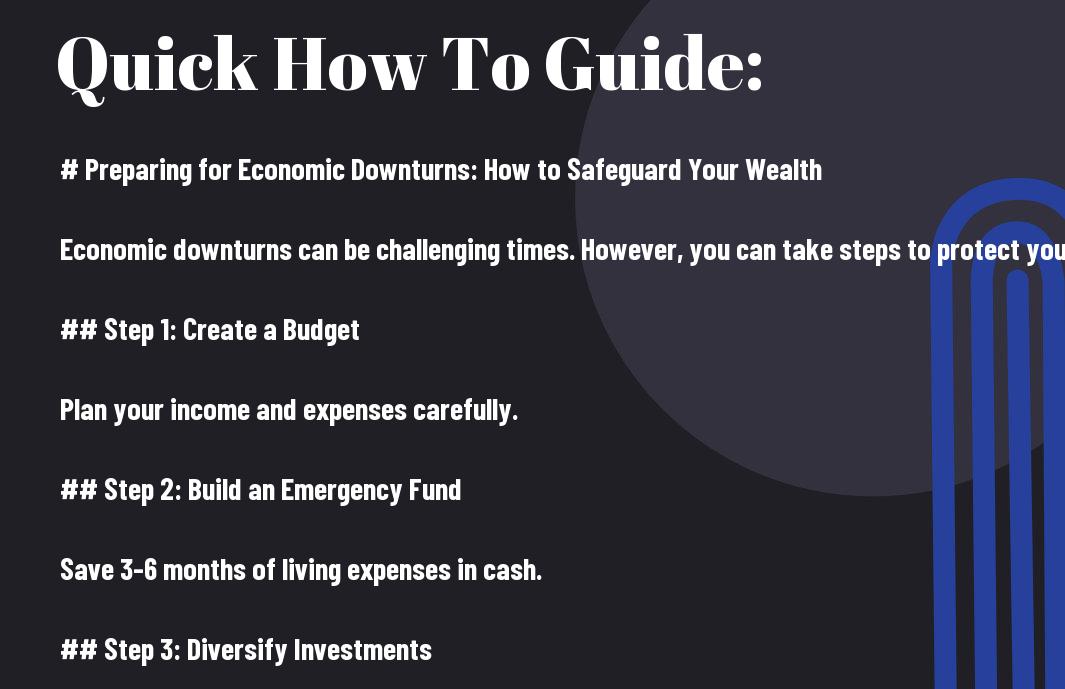Most people worry about how to protect their finances during tough economic times. You may feel anxious about falling prices, rising unemployment, or unexpected expenses. Fortunately, you can take steps to safeguard your wealth. In this guide, you’ll learn practical strategies to help you stay financially secure. For more tips, check out these 15 Ways To Strengthen Your Finances Ahead Of A … and get ready for any economic challenges ahead.

Key Takeaways:
- Diversify Your Assets: Spread your investments across different areas. This helps reduce risk when one area is struggling.
- Build an Emergency Fund: Save enough money to cover 3 to 6 months of expenses. This fund can help you stay afloat during tough economic times.
- Stay Informed About Economic Trends: Keep track of news and analysis on the economy. Understanding what’s happening can help you make better financial decisions.

Understanding Economic Downturns
To safeguard your wealth, it’s vital to understand what economic downturns are. An economic downturn is a period when the economy slows down. This can lead to job losses and reduced consumer spending. By preparing yourself, you can mitigate the effects of these downturns. You can learn more about Protecting Yourself From A Recession.
What Causes Economic Downturns
One major factor that causes economic downturns is a decline in consumer confidence. When people feel uncertain about their jobs or the future, they spend less money. Other factors include high inflation, rising interest rates, and global events like natural disasters or pandemics. Understanding these causes helps you prepare better.
Signs of a Recession
On the lookout for signs of a recession is vital for your financial planning. Key indicators include rising unemployment rates, decreasing GDP, and falling stock prices. If you notice these trends, it may be time to reevaluate your finances and savings strategy.
Causes of these signs often stem from various economic factors. For example, if businesses report lower profits, they may lay off workers, increasing unemployment. Additionally, if consumer spending decreases, GDP can fall. Staying informed about these signs can help you make better financial decisions during tough economic times.

How to Assess Your Financial Situation
Now is the time to assess your financial situation to safeguard your wealth during tough economic times. Start by taking a close look at your income, savings, and debts. You can find helpful advice on how to prepare for a recession: 15 tips to protect your money. Understanding where you stand will help you make informed decisions and plan effectively for the future.
Evaluating Your Assets
Little steps can lead to big changes. Begin by listing all your assets, including cash, investments, and property. Knowing the value of these will give you a clearer picture of your financial health. Consider factors like market conditions that could affect your assets’ worth. This assessment is crucial to determine what you can rely on during challenging times.
Tracking Your Expenses
Evaluating your spending habits helps you identify areas where you can cut back. Keep a record of all your expenses, no matter how small. This will show you where your money goes each month and help you find savings.
Plus, tracking your expenses regularly can alert you to unnecessary spending habits. You can use budgeting tools or apps to simplify this process. By staying aware of your financial flow, you can prioritize crucial needs and reduce wasteful spending, enabling you to save more during uncertain economic periods.
Tips for Diversifying Your Investments
Your strategy for diversifying investments can protect your wealth during an economic downturn. Here are some helpful tips:
- Invest in different asset classes, like stocks, bonds, and real estate.
- Consider international investments to spread your risk geographically.
- Look into mutual funds or ETFs for instant diversification.
- Regularly review and adjust your portfolio based on market conditions.
After following these tips, you can create a solid foundation for your financial future.
Importance of Diversification
On maintaining a diverse investment portfolio can reduce your overall risk. By spreading your money across various types of investments, you’re less likely to suffer big losses if one area performs poorly. This approach not only safeguards your wealth but also can lead to more stable returns over time.
Investment Options to Consider
Diversification isn’t just about mixing stocks and bonds; it involves a variety of investment options. You might want to include real estate, commodities, and even cryptocurrencies in your portfolio. Each of these options comes with its own risk and rewards.
Options like real estate can offer stable income through rents, while commodities like gold can act as a safe haven during economic uncertainty. Cryptocurrencies may be more volatile, but they can also provide high returns. By combining these different assets, you can create a well-rounded investment strategy that helps protect your wealth even in tough times.
How to Build an Emergency Fund
All financial experts agree that building an emergency fund is key to safeguarding your wealth during economic downturns. This fund acts as a safety net for unexpected expenses like medical bills, car repairs, or job loss. Aim to save enough to cover three to six months of living expenses. This way, you can avoid going into debt when these situations arise. By establishing your emergency fund now, you can feel more secure in your financial future.
Setting Savings Goals
On your journey to building an emergency fund, setting clear savings goals is important. Start by calculating your monthly expenses to determine how much money you need to save. Break this amount down into smaller, manageable goals. For example, you might aim to save $500 in the first two months. This approach makes saving less daunting and gives you achievable milestones to work towards.
Where to Keep Your Emergency Fund
While deciding where to keep your emergency fund, consider safe and easily accessible options. A regular savings account at your bank is a good choice because it offers quick access to your money. Online savings accounts can also provide better interest rates, helping your fund grow a little over time. Avoid keeping your emergency fund in investments that can lose value. You want this money to be secure and ready for use whenever you need it.
Goals for your emergency fund should focus on accessibility and safety. Keeping it in a high-yield savings account offers better interest rates than traditional accounts while allowing you to withdraw cash when needed. Take time to research different banks and account types. Look for accounts that have no or low fees. You want your emergency savings to work for you without unnecessary costs. Prioritizing both access and growth keeps your fund secure for when emergencies arise.

Factors Influencing Wealth Protection
Once again, you need to consider various factors when protecting your wealth. Economic downturns can stem from multiple influences that affect your financial stability. Here are some key factors to keep in mind:
- Economic conditions
- Inflation rates
- Interest rates
- Market trends
- Government policies
Recognizing these factors can help you make informed decisions about safeguarding your wealth.
Economic Indicators to Watch
Now, it’s important to keep an eye on specific economic indicators. These indicators help you assess the health of the economy. Some important ones include unemployment rates, GDP growth, and consumer confidence. Tracking these metrics allows you to anticipate potential downturns.
Political and Social Influences
There’s a strong link between political stability and your financial security. Changes in government policies can impact taxes, regulations, and overall economic health. These changes can occur quickly and without warning, affecting your wealth.
A safe environment for your investments is vital. Instability in government can lead to market volatility, which may affect your investment portfolios. Social factors, like public sentiment and activism, can also drive changes that influence the economy. Staying informed about these influences will help you make better financial decisions.
Strategies for Reducing Debt
For many individuals, debt can feel overwhelming, especially during economic downturns. To safeguard your wealth, it’s crucial to have solid strategies to reduce your debt. Start by understanding where your money goes and prioritize paying off high-interest debts first. This way, you can free up more money in your budget, allowing you to save or invest for future challenges.
Prioritising Your Debts
Even if you have multiple debts, it’s important to rank them based on interest rates and outstanding balances. Focus on paying off debts that cost you the most money in interest first. This approach not only saves you money over time but also helps you see progress quickly, motivating you to continue your efforts.
Creating a Payoff Plan
Some debt payers benefit greatly from having a clear plan. Start by listing all your debts and their interest rates. Calculate how much extra money you can put toward these debts each month. Decide which debts to tackle first and set realistic deadlines for paying them down. A clear and structured repayment plan will keep you on track.
To ensure your payoff plan is effective, include small, achievable goals. For instance, consider using the snowball method by paying off the smallest debts first to build momentum. Or, you can take the avalanche method to save on interest by tackling the debts with the highest rates. Utilizing budgeting tools and apps can help you stay organized and committed to your plan.
To wrap up
Upon reflecting, preparing for economic downturns is imperative to safeguarding your wealth. You can take practical steps to protect your finances by diversifying your investments, building an emergency fund, and staying informed about economic trends. Additionally, reducing debt and living within your means can provide a safety net during tough times. By adopting these strategies, you empower yourself to weather financial storms and maintain your financial security.
FAQ: Preparing for Economic Downturns – How to Safeguard Your Wealth
Q1: What is an economic downturn?
A: An economic downturn is a period when the economy slows down. During this time, businesses may earn less money, people might lose their jobs, and overall spending decreases. This can lead to a recession, which often lasts for several months or even years.
Q2: How can I prepare my finances for an economic downturn?
A: To prepare your finances, consider these steps:
- Build an emergency fund: Save three to six months’ worth of expenses in a separate account.
- Reduce debt: Pay off high-interest loans to reduce financial stress.
- Diversify investments: Spread your investments across different areas to minimize risk.
- Cut unnecessary expenses: Review your monthly spending and eliminate items you don’t need.
Q3: What types of investments are safer during an economic downturn?
A: During tough economic times, consider safer investments like:
- Government bonds: These are usually more stable and less risky.
- Real estate: Property values can remain steady or increase, even in downturns.
- Defensive stocks: Companies that sell necessary goods tend to do well, such as utilities and healthcare.
- Gold and precious metals: These often hold value when the economy declines.
Q4: Should I sell my investments during a downturn?
A: Selling investments during a downturn can lead to losses. Instead, stay calm and focus on your long-term goals. If your investments are in solid companies or funds, consider holding on until the market improves. This strategy often leads to better results over time.
Q5: How can I find reliable information to guide my financial decisions?
A: To find trustworthy information, look for sources like:
- Reputable financial news websites: Websites like CNBC or Bloomberg provide insights into market trends.
- Financial advisors: A professional can offer personalized advice tailored to your situation.
- Books and online courses: Many resources are available to learn about personal finance and investing.
Key Takeaways
Preparing for an economic downturn involves building an emergency fund, reducing debt, and diversifying your investments. Stay calm during market fluctuations and seek reliable information to make informed decisions. By taking these steps, you can protect your wealth and remain financially secure during uncertain times.




